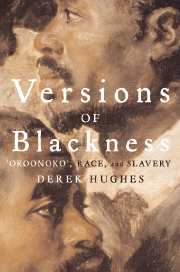Book contents
- Frontmatter
- Contents
- Introduction
- A Note on the Texts
- Chronology
- PART ONE THE MAJOR TEXTS
- PART TWO CONTEXTS: EUROPE, AMERICA, AND AFRICA
- A Short Account of the Destruction of the Indies
- Democrates Secundus
- “Of the Cannibals” and “Of Coaches”
- On Spreading the Gospel Among the Savages
- The English-American his Travail by Sea and Land
- A True and Exact History of the Island of Barbados
- The History of Sir Francis Drake
- Voyage de la France Equinoxiale en l'Isle de Cayenne
- An Exact Relation of the Most Execrable Attempts of John Allin
- The History of the Caribby-Islands
- Histoire Generale des Antilles Habitées par les François
- An Impartial Description of Surinam
- Great Newes from the Barbadoes
- The Negro's and Indians Advocate
- Friendly Advice to the Gentlemen Planters of the East and West Indies
- DISCUSSIONS OF COLONIALISM
- Bibliography
- Index
The Negro's and Indians Advocate
Published online by Cambridge University Press: 05 June 2012
- Frontmatter
- Contents
- Introduction
- A Note on the Texts
- Chronology
- PART ONE THE MAJOR TEXTS
- PART TWO CONTEXTS: EUROPE, AMERICA, AND AFRICA
- A Short Account of the Destruction of the Indies
- Democrates Secundus
- “Of the Cannibals” and “Of Coaches”
- On Spreading the Gospel Among the Savages
- The English-American his Travail by Sea and Land
- A True and Exact History of the Island of Barbados
- The History of Sir Francis Drake
- Voyage de la France Equinoxiale en l'Isle de Cayenne
- An Exact Relation of the Most Execrable Attempts of John Allin
- The History of the Caribby-Islands
- Histoire Generale des Antilles Habitées par les François
- An Impartial Description of Surinam
- Great Newes from the Barbadoes
- The Negro's and Indians Advocate
- Friendly Advice to the Gentlemen Planters of the East and West Indies
- DISCUSSIONS OF COLONIALISM
- Bibliography
- Index
Summary
Godwyn was a member of a distinguished British ecclesiastical family. He graduated from Christ Church, Oxford, in 1665, served briefly as a vicar in Wendover, Bucks, and then traveled to Virginia and subsequently Barbados. His work is particularly interesting in that it records the intellectual bases on which slave owners were attempting to deny human status to black Africans. Prominent among these beliefs is the use of the pre-Adamite heresy (the belief that there were men before Adam) to deny that Europeans and black Africans had a common ancestor in Adam. Godwyn insists that black Africans have the same bodily constitution and intellectual faculties as Europeans and that differences between them are not innate, but rather the products of culture and education. He is, however, promoting the conversion and humane treatment of slaves, not their liberation, and he argues that a Christian slave is more docile than a heathen one.
And the Spaniards question (which the same Taverneir also mentions) touching the Brutality of the Americans, (and, which I have heard was held in the Affirmative in one of the Universities of Spain) serving not a little to make my report more credible; and to acquit me of all fictitious Romancing herein. Wherefore it being granted for possible that such wild Opinions, by the inducement and instigation of our Planters chief Deity, Profit, may have lodged themselves in the Brains of some of us; I shall not fear to betake my self to the refuting of this one which I have spoken of.
- Type
- Chapter
- Information
- Versions of BlacknessKey Texts on Slavery from the Seventeenth Century, pp. 344 - 348Publisher: Cambridge University PressPrint publication year: 2007



